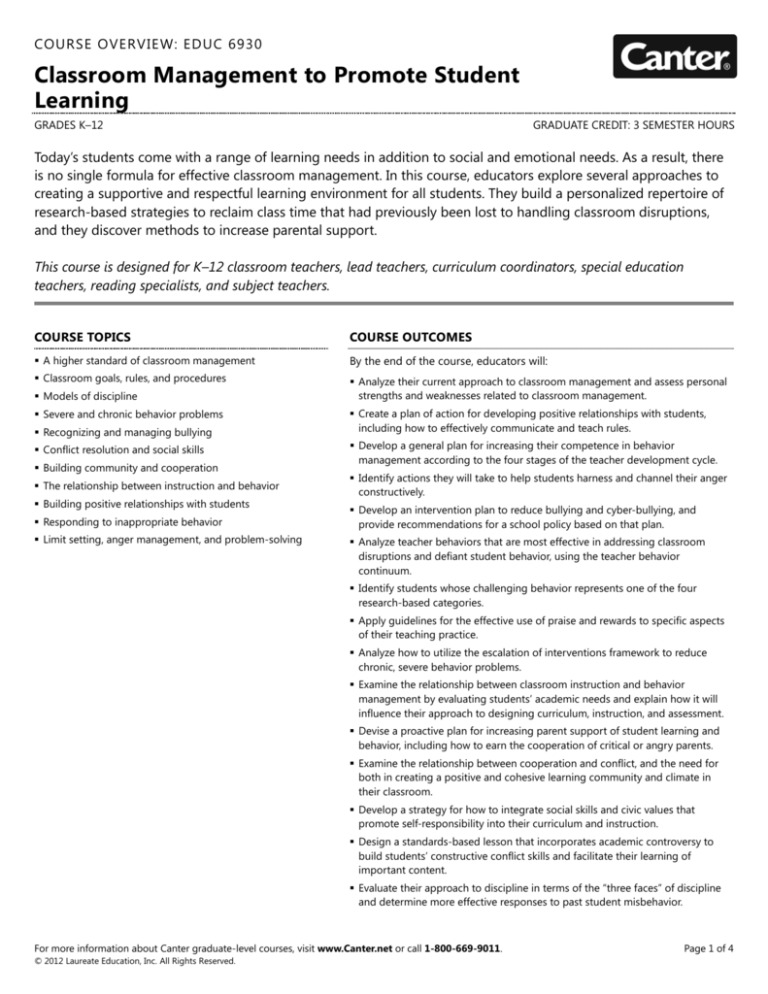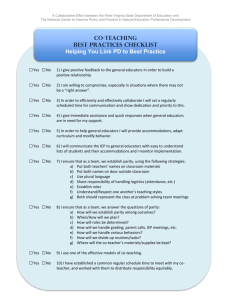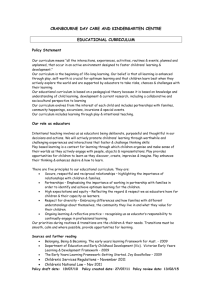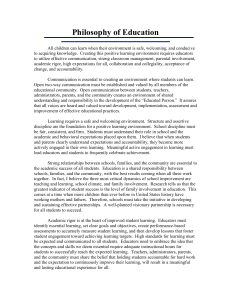
COURSE OVERVIE W: EDUC 6930
Classroom Management to Promote Student
Learning
GRADES K–12
GRADUATE CREDIT: 3 SEMESTER HOURS
Today’s students come with a range of learning needs in addition to social and emotional needs. As a result, there
is no single formula for effective classroom management. In this course, educators explore several approaches to
creating a supportive and respectful learning environment for all students. They build a personalized repertoire of
research-based strategies to reclaim class time that had previously been lost to handling classroom disruptions,
and they discover methods to increase parental support.
This course is designed for K–12 classroom teachers, lead teachers, curriculum coordinators, special education
teachers, reading specialists, and subject teachers.
COURSE TOPICS
COURSE OUTCOMES
A higher standard of classroom management
By the end of the course, educators will:
Classroom goals, rules, and procedures
Analyze their current approach to classroom management and assess personal
strengths and weaknesses related to classroom management.
Models of discipline
Severe and chronic behavior problems
Recognizing and managing bullying
Conflict resolution and social skills
Building community and cooperation
The relationship between instruction and behavior
Building positive relationships with students
Responding to inappropriate behavior
Limit setting, anger management, and problem-solving
Create a plan of action for developing positive relationships with students,
including how to effectively communicate and teach rules.
Develop a general plan for increasing their competence in behavior
management according to the four stages of the teacher development cycle.
Identify actions they will take to help students harness and channel their anger
constructively.
Develop an intervention plan to reduce bullying and cyber-bullying, and
provide recommendations for a school policy based on that plan.
Analyze teacher behaviors that are most effective in addressing classroom
disruptions and defiant student behavior, using the teacher behavior
continuum.
Identify students whose challenging behavior represents one of the four
research-based categories.
Apply guidelines for the effective use of praise and rewards to specific aspects
of their teaching practice.
Analyze how to utilize the escalation of interventions framework to reduce
chronic, severe behavior problems.
Examine the relationship between classroom instruction and behavior
management by evaluating students’ academic needs and explain how it will
influence their approach to designing curriculum, instruction, and assessment.
Devise a proactive plan for increasing parent support of student learning and
behavior, including how to earn the cooperation of critical or angry parents.
Examine the relationship between cooperation and conflict, and the need for
both in creating a positive and cohesive learning community and climate in
their classroom.
Develop a strategy for how to integrate social skills and civic values that
promote self-responsibility into their curriculum and instruction.
Design a standards-based lesson that incorporates academic controversy to
build students’ constructive conflict skills and facilitate their learning of
important content.
Evaluate their approach to discipline in terms of the “three faces” of discipline
and determine more effective responses to past student misbehavior.
For more information about Canter graduate-level courses, visit www.Canter.net or call 1-800-669-9011.
© 2012 Laureate Education, Inc. All Rights Reserved.
Page 1 of 4
CLASSROOM MANAGEMENT TO PROMOTE STUDENT LEARNING
METHODS OF ASSESSMENT
This course provides numerous opportunities to apply research-based concepts and theory to practical teaching situations. Assessment is
conducted in the following ways:
•
Activities are short assessments that help educators explore concepts and make connections between the content and their
teaching practice. Some activities are ungraded but serve to prepare educators for other graded assignments. Any ungraded
activities are clearly marked as such.
•
Study Team Discussions (print & DVD) or Dialogue Summaries (online) allow educators to share ideas about the course
content with other teachers, then ask them to analyze and summarize the discussion and then describe how their understanding of
the topic has been enhanced or expanded.
•
Applications assist educators in applying the theories, concepts, and strategies to their teaching practice.
•
Quizzes provide educators with instant feedback (online only) on their understanding of the course material. There are three
quizzes, each reviewing several sections of content.
•
The Final Reflection requires educators to synthesize the content and reflect on their key learnings throughout the course.
COURSE MATERIALS AND FORMAT
Course texts, websites, and journal articles help facilitate learning and transfer theory into practice. Video programs feature interviews with
nationally recognized education experts. Classroom scenes provide a view into the classrooms of master teachers who demonstrate the
strategies taught in the course. This course is offered in two distance-learning formats: print & DVD and online. Educators select one format
when they enroll.
PRINT & DVD FORMAT
ONLINE FORMAT
Educators in the print & DVD version of the course receive printed
materials to facilitate their learning. This version of the course
requires educators to form a study team. The educator must have at
least one study partner or peer coach, preferably another educator,
to complete activities, engage in discussion, and seek feedback. It is
not necessary that the study partner be enrolled in the course.
Educators enrolled in the print & DVD version should have Internet
access in order to connect with the many websites that are offered as
learning resources. Assignments are submitted via email. The print &
DVD course includes:
Educators in the online version of the course access the course
content via an online classroom. Educators are required to
participate in virtual discussions with fellow educators via a
discussion board. The course textbook is shipped to educators,
but the video programs and other resources are available within
the online classroom. Assignments are submitted through the
online classroom. The online course includes:
The print study guide:
Access to the video programs in the online classroom as well
as a backup DVD:
Classroom Management to Promote Student Learning
The DVD:
Laureate Education, Inc. (Executive Producer). (2009). Classroom
management to promote student learning. Baltimore: Executive
Producer.
The course textbook(s):
Jones, V. & Jones, L. (2009). Comprehensive classroom
management: Creating communities of support and solving
problems (9th ed.). Upper Saddle River, NJ: Prentice Hall.
Access to online classroom for:
Classroom Management to Promote Student Learning
Laureate Education, Inc. (Executive Producer). (2009).
Classroom management to promote student learning.
Baltimore: Executive Producer.
The course textbook(s):
Jones, V. & Jones, L. (2007). Comprehensive classroom
management: Creating communities of support and solving
th
problems (8 ed.). Upper Saddle River, NJ: Prentice Hall.
Access to the other required readings
The other required readings
For more information about Canter graduate-level courses, visit www.Canter.net or call 1-800-669-9011.
© 2012 Laureate Education, Inc. All Rights Reserved.
Page 2 of 4
CLASSROOM MANAGEMENT TO PROMOTE STUDENT LEARNING
SYSTEM REQUIREMENTS FOR ONLINE COURSE FORMAT:
Operating system for PC: Windows® XP, Windows Vista®, or Windows® 7
Operating system for Mac®: OS X or higher
Processor: 1 GHz, 32/64 bit or higher
Memory: Minimum 512 MB of RAM; 1 GB recommended
Browser: Microsoft Internet Explorer® 6.0 or higher; Firefox® 3.6 (also for Mac®: Apple® Safari® 4 or higher)
Internet connection: Broadband (DSL, cable modem, or similar) required
Software: Microsoft Word®, Adobe® Flash® Player 7 or higher (free), Adobe® Acrobat® Reader® version 8 or higher (free)
Monitor resolution: 1280 x 800 pixels or higher
®
®
®
Note: If you are using a Macintosh , please be sure to download Mozilla Firefox 3.6. It’s free, and the download should take only a few minutes at
www.mozilla.org.
Trademark Information
Microsoft, Windows, Windows Vista, Internet Explorer, and Word are registered trademarks of Microsoft Corporation in the United States and/or other countries.
Mac OS and Macintosh are trademarks of Apple Inc., registered in the United States and other countries.
Mozilla and Firefox are registered trademarks of the Mozilla Foundation.
Adobe, Flash, and Acrobat Reader are registered trademarks of Adobe Systems Incorporated in the United States and/or other countries.
EDUCATION EXPERTS
Lee Canter, M.S.W.
Lee Canter is a nationally recognized expert in behavior management. His programs have helped over one million educators create
more harmonious classroom and school environments, where teachers can teach and students can achieve greater success. He is the
®,
®
author of numerous books, including Assertive Discipline The High-Performing Teacher , Classroom Management for Academic Success,
®
and Succeeding with Difficult Students .
Arthur L. Costa, Ed.D.
Dr. Arthur Costa is professor emeritus at the School of Education, California State University, Sacramento. He is also co-director of the
Institute for Intelligent Behavior and former national president of the Association for Supervision and Curriculum Development. Dr. Costa has
worked with educational associations around the globe and has authored more than 100 journal articles, books, and papers.
Carolyn M. Evertson, Ph.D.
Dr. Carolyn Evertson is professor of education emerita of Peabody College at Vanderbilt University. She initiated the Classroom Organization
and Management Program (COMP), a teacher-training curriculum extensively implemented throughout the United States. Dr. Evertson has
written and edited numerous books and articles.
David W. Johnson, Ed.D.
Dr. David W. Johnson, professor at the University of Minnesota, is internationally known for his extensive educational
research, which has spanned the past 30 years. He is a fellow of the American Psychological Association and best known as a
pioneer in cooperative learning. Dr. Johnson has authored more than 550 books and articles.
Deborah Stipek, Ph.D.
Dr. Deborah Stipek is a professor of education and formerly the I. James Quillen Dean at the School of Education at Stanford University. Dr.
Stipek’s extensive publications highlight various aspects of human development, including the book Motivation to Learn: Integrating Theory
and Practice.
Patricia Wolfe, Ed.D.
Dr. Pat Wolfe, a veteran educational consultant and staff-development trainer, has developed expertise in the study of brain functions and
their implications for teaching and learning. She has developed and published articles, books, and videos for educators.
For more information about Canter graduate-level courses, visit www.Canter.net or call 1-800-669-9011.
© 2012 Laureate Education, Inc. All Rights Reserved.
Page 3 of 4
CLASSROOM MANAGEMENT TO PROMOTE STUDENT LEARNING
ABOUT OUR PARTNERSHIP
ABOUT CANTER
Canter, a subsidiary of Laureate Education, Inc., is
committed to serving the educational community
with high-quality, graduate-level courses that blend
research-based theory with practical strategies.
Canter began with one groundbreaking guide on
managing behavior in the classroom and, more than
35 years later, has helped more than 300,000
educators address the most critical issues in
education while advancing their careers.
FOR MORE INFORMATION
For more information about Canter graduate-level
courses, visit www.Canter.net or call 1-800-669-9011.
Canter offers its courses in partnership with Walden University,
allowing you to benefit from Canter’s quality curriculum in a selfpaced format, while earning graduate credit from a leading
accredited university.* The course curriculum is developed and
designed by Canter in collaboration with national education
experts, while graduate credit is granted through Walden
University, which assesses student work. Credit may be applicable
Ɨ
for certification renewal and/or salary advancement. Course
credit may be transferable with prior approval from the university
providing your advanced degree or planned program.
Walden University
The Richard W. Riley College of Education and Leadership at
Walden University is a National Council for Accreditation of
Teacher Education (NCATE)–accredited college dedicated to
enhancing educator effectiveness. As a recognized standard of
excellence in professional education for the preparation of
teachers, administrators, and other pre-K–12 school
professionals, NCATE accreditation ensures the college has met
rigorous national standards set by the profession and members
of the public.
The college, named for the former Secretary of the U.S.
Department of Education, was identified by U.S. News & World
Report as having the largest online graduate program in
education by enrollment (May 2010). Walden students were
awarded the fourth most TEACH Grants to students nationwide in
2010–2011, according to the U.S. Department of Education. The
choice of more than 53,000 students and alumni, including more
than 80 state teachers of the year, the college is also a proud
partner of the National Education Association (NEA) Academy
and a year-round sponsor of the National Association for the
Education of Young Children (NAEYC).
Walden University is accredited by The Higher Learning
Commission and a member of the North Central Association,
www.ncahlc.org. Canter and Walden University are both
subsidiaries of Laureate Education, Inc.
*Prospective Washington state students are advised to contact the Office of the Superintendent of Public Instruction at 1-360-725-6275
or prof.educ@k12.wa.us to determine whether Walden’s programs in the field of education are approved for teacher certification or
endorsements in Washington state. Additionally, teachers are advised to contact their individual school district as to whether this
program may qualify for salary advancement.
Ɨ
It is each student’s responsibility to check with his or her state/district and evaluate and understand any requirements related to the use
of individual courses for any purpose.
For more information about Canter graduate-level courses, visit www.Canter.net or call 1-800-669-9011.
© 2012 Laureate Education, Inc. All Rights Reserved.
Page 4 of 4




